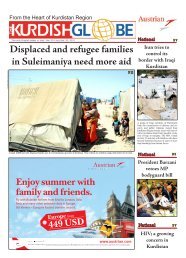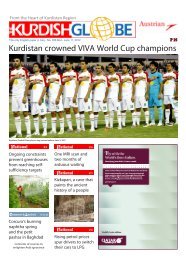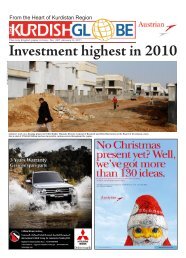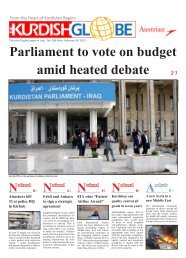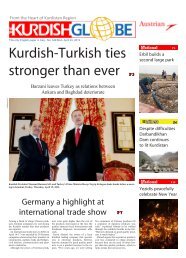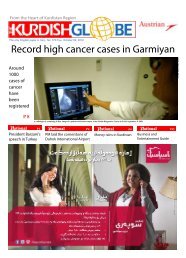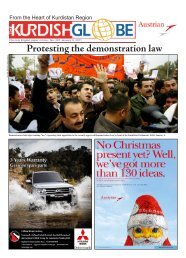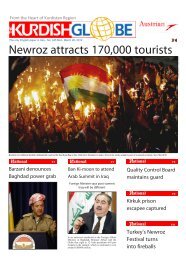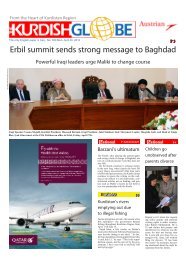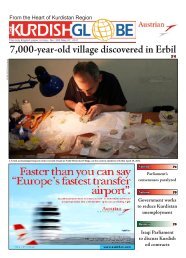KDP confirms government rotation - Kurdish Globe
KDP confirms government rotation - Kurdish Globe
KDP confirms government rotation - Kurdish Globe
You also want an ePaper? Increase the reach of your titles
YUMPU automatically turns print PDFs into web optimized ePapers that Google loves.
The <strong>Kurdish</strong> <strong>Globe</strong> No. 335, Saturday, January 07, 2012 2<br />
Kurds must “use their aces wisely”<br />
<strong>Globe</strong> Editorial<br />
The fear of the disintegration of<br />
Iraq is hardly breaking news. A<br />
persistent theme of the past nineor<br />
so years of the new Iraq has been<br />
how to preserve unity and bring<br />
about true national reconciliation<br />
amongst a climate of deep misti<br />
trust.<br />
Iraq in its transition to democri<br />
racy may have achieved historical<br />
junctures, but it has often stumbled<br />
to its milestones as opposed to a<br />
painless arrival at its new dawn.<br />
More often than not, the major<br />
achievements in Iraq were undersi<br />
scored by heavy U.S. pressure<br />
and much political jockeyingand<br />
drama in Baghdad. As successive<br />
crises have brewed, asemblance<br />
of calm was somewhat reinstated<br />
in the short term by last-minute<br />
dealings,but too often at the expi<br />
pense of any long-term benefits. A<br />
policy of brushing key issues undi<br />
der the political rug always ran the<br />
risk of haunting the Iraqi political<br />
arena at some stage,and just days<br />
after the U.S.symbolic withdrawal<br />
from Iraq, another explosive crisis<br />
reared its ugly head in Iraq.<br />
If the issues are assessed at the<br />
surface, then one can argue that<br />
current turmoil was instigated<br />
by Iraqi Prime Minister Nouri<br />
al-Maliki’sissuance of an arrest<br />
warrant against Iraq's Sunni Vice<br />
President Tariq al-Hashemi and the<br />
subsequent ploy to sideline Sunni<br />
Deputy Prime Minister Saleh al-<br />
Mutlak from power. However,<br />
the water has been boiling on the<br />
sieve for several months, and for<br />
one reason or another, it wouldn’t<br />
have taken much to tip sentiments<br />
over the edge.<br />
Just take the current brittle coai<br />
alition that was remarkably conci<br />
cluded after 11 months and set an<br />
unwanted world record. That in<br />
itself sums up all that is needed to<br />
explain the current upheaval and<br />
instability.<br />
Even though Iyad Allawi’s predi<br />
dominantly Sunni-based al-Iraqiyi<br />
ya group was the ultimate victor<br />
at the polls, they were threatened<br />
withbeingmarginalised by al-Mali<br />
liki’s Shiite Coalition. Months of<br />
wrangling ensured agreement on<br />
power-sharing but more through<br />
Iraqi Prime Minister Nuri al-Maliki delivers a speech during a ceremony at Al-Shaab stadium complex in central<br />
Baghdad on December 31, 2011.<br />
gritted teeth than true brotherly<br />
reconciliation.<br />
Once al-Iraqiya didn’t get the<br />
power it demanded and real deci<br />
cision-makingauthority, it was<br />
only a question of time before<br />
the political landscape would be<br />
rocked once more. Almost two<br />
years since the national elections,<br />
a number of key positions remain<br />
unfilled and still in the hands of<br />
al-Maliki in what was supposedly<br />
a temporary basis.<br />
Turkish anxiety has dramatically<br />
increased by unfolding events,<br />
leading Ankara to go back and<br />
forth between Baghdad and Washi<br />
ington in recent weeks and warni<br />
ing about the dangers of an Iraqi<br />
disintegration. Although Turkey<br />
may have chosen to ignore reality<br />
for a while, the writing has been<br />
on the Iraqi wall for decades and<br />
particularly these past nine years.<br />
There is no danger of Iraqi fragmi<br />
mentation. It is already fragmentei<br />
ed, and now it’s only a question<br />
of just how far the disintegration<br />
will go; regional countries must<br />
accept that reality sooner or latei<br />
er. Democracy has been fraught<br />
with difficulty in Iraq with voting<br />
along heavy sectarian and ethnic<br />
lines. Voting has been almost akin<br />
to a de facto national census than<br />
a true national voice gathering exei<br />
ercise.<br />
While Turkey and neighbouri<br />
ing countries seemingly worked<br />
to promote national harmony and<br />
reconciliation in Iraq, ironically<br />
they have been responsible for the<br />
entrenchment of camps in Iraq.<br />
Successive Shiite <strong>government</strong>s<br />
have swayed heavily toward Tehri<br />
ran, whilst Sunni groups, essenti<br />
tially marginalised from power<br />
from their heyday under Saddam<br />
Hussein, have worked to force a<br />
hand at the political table through<br />
the threat of insurgency or<br />
through jockeying in the political<br />
chambers. Turkmen have used the<br />
big brother threat, calling on the<br />
support of Turkey to ensure their<br />
cards on the table are not ignored,<br />
while for the Kurds it has been a<br />
case of not letting the rest of Iraq<br />
drag the prosperous Kurdistan<br />
Region down with them and at the<br />
same time building strategic ties<br />
to boost their autonomous status<br />
and growing economic clout.<br />
How regional sectarian influence<br />
continues to grip Iraq can be seen<br />
with al-Maliki’s persistent support<br />
of the much maligned and underfire<br />
Bashar al-Assad in Syria.<br />
This week al-Iraqiya kept up<br />
their boycott of Iraq’s Parliament<br />
and Cabinet, accusing al-Maliki<br />
of monopolising power and not<br />
abiding by the terms that led to<br />
the eventual breakthroughof the<br />
current coalition.<br />
Accusations of the centralising<br />
of power by al-Maliki are hardly<br />
new; it was a frequent criticism<br />
throughout the last election term.<br />
With the importance of upholdi<br />
ing calm and dialogue seemingly<br />
at large, a national conference has<br />
been proposed that should be held<br />
sometime this month. A national<br />
conference may save the day in<br />
the short term as did the Erbil<br />
agreement, but true concord may<br />
prove elusive once more.<br />
No amount of political mani<br />
noeuvring at the end of the day<br />
can paper over deep mistrust and<br />
animosity. Even if national electi<br />
tions were held early, the end<br />
game would be the same. There is<br />
no guarantee that Iraq would not<br />
end up at the same juncture after<br />
new elections are held whilst the<br />
key ingredients that continuousli<br />
lypoison the political atmosphere<br />
remain.<br />
As for now, it is unlikely that<br />
al-Maliki will relinquish his firm<br />
grip on power. While al-Maliki<br />
has been under intense domestic<br />
and regional spotlight, he may esci<br />
cape this current escapade largely<br />
unscathed. Al-Iraqiya have used<br />
the threat of boycott, but with so<br />
many Sunnis in their ranks badly<br />
scarred from the boycott campi<br />
paignsof the previous campaigns,<br />
it is unclear just how far the loyai<br />
alty of their MPs stretch.<br />
The current political tension<br />
ALI AL-SAADI/AFP/Getty Images<br />
may have hurt al-Iraqiya further<br />
with 11 politicians already revi<br />
voking their ties to the alliance.<br />
Al-Iraqiya MPs are mindful that<br />
further boycotts or spotlight may<br />
see more positions of power reli<br />
linquished to the powerful Shiite<br />
alliance.<br />
The biggest danger is a coaliti<br />
tion without al-Iraqiya altogether<br />
where al-Maliki musters suppi<br />
port from Kurds and al-Iraqiya<br />
dissidents,a scenario that would<br />
certainly place sectarian tensions<br />
into overdrive. The recent spate<br />
of initiatives toward autonomy by<br />
predominantly Sunni provinces is<br />
an indicator of growing Sunni fear<br />
that preservation of local power<br />
aside, they may be confounded<br />
to a running battle to avoid being<br />
sidelined in Baghdad.<br />
The Kurds, who have attempted<br />
to remain neutral, once again<br />
find themselves with all the aces.<br />
Only with <strong>Kurdish</strong> support could<br />
al-Iraqiya spearhead a new govei<br />
ernment and only with <strong>Kurdish</strong><br />
support could al-Maliki be ousted<br />
from <strong>government</strong>.<br />
Logic would dictate that after<br />
many failed promises by al-Mali<br />
liki toward the Kurds, including<br />
the lack of implementation of the<br />
vast majority of conditions that he<br />
signed up to as a prelude to Kurdi<br />
ish support, the Kurds would side<br />
with al-Iraqiya. However, the new<br />
crisis and the key <strong>Kurdish</strong> role of<br />
calming tensions, gives the opporti<br />
tunity for the Kurds to preserve<br />
al-Maliki’s seat and the current<br />
coalition, but no doubt with much<br />
sterner warningsand conditions<br />
for the Shiite Alliance and al-Mali<br />
liki.<br />
The fact remains that all too ofti<br />
ten al-Maliki has boldly reneged<br />
on agreements with Kurds and has<br />
simply gotten away with it, even<br />
as the Kurds have saved al-Mali<br />
liki’s political skin on more than<br />
one occasion. The issue of dispi<br />
puted territories remains as open<br />
and pertinent as ever, Baghdad<br />
remains at loggerheads with the<br />
Kurds on oil sharing, and Baghdi<br />
dad has hardly provided a positive<br />
endorsement of growing <strong>Kurdish</strong><br />
strategic clout and prosperity. It<br />
is time for the Kurds to use their<br />
aces wisely.<br />
Bashdar Pusho Ismaeel<br />
Weekly paper printed in Erbil<br />
First published in 2005<br />
www.kurdishglobe.net<br />
info.kurdishglobe<br />
@gmail.com<br />
Address:<br />
Erbil, Bakhtiyari Quarter<br />
EXECUTIVE EDITOR<br />
Jawad Qadir<br />
EDITOR<br />
Azad Amin<br />
azad.kurdishglobe@gmail.com<br />
Senior U.S. Editor<br />
Suzanne DeRouen<br />
suzi.kurdishglobe@yahoo.com<br />
Associate U.S. Editor<br />
Elizabeth Schmitt<br />
elizabethschmitt@earthlink.net<br />
Senior U.K. Editor<br />
Bashdar Pusho Ismaeel<br />
bashdar@hotmail.com<br />
Ako Muhammed<br />
+964 750 4661936<br />
ako.kurdishglobe@gmail.com<br />
Aiyob Mawloodi<br />
+964 750 4776905<br />
aiyob.kurdishglobe@gmail.com<br />
Qassim Khidhir<br />
+964 750 4823081<br />
qassim.kurdishglobe@gmail.com<br />
STAFF WRITERS<br />
Sazan M. Mandalawi<br />
sazan.kurdishglobe@gmail.com<br />
Zakaria Muhammed<br />
+964 750 475 3897<br />
zakaria.kurdishglobe@gmail.com<br />
Hawzhen Rashadaddin<br />
+964 750 4707416<br />
hawjin.kurdishglobe@gmail.com<br />
ARTS EDITOR<br />
Diyaco Qayoumy +964 750 4036252<br />
diyaco.kurdishglobe@gmail.com<br />
Advertisement<br />
For information and prices of ad spots, please contact<br />
<strong>Globe</strong>’s Advertisement section: Rizgar Yahya<br />
rizgar.kurdishglobe@gmail.com<br />
Cell: +964 750 4055888<br />
You can also check prices and packages by logging<br />
on to: kurdishglobe.net/ad<br />
Subscription<br />
The <strong>Kurdish</strong> <strong>Globe</strong> can be delivered to your office or<br />
home address, whether in Kurdistan or abroad.<br />
To subscribe: Please contact the <strong>Globe</strong> Distribution<br />
Section: Rauf Aspindarai<br />
rauf.kurdishglobe@gmail.com<br />
+964 750 4497976<br />
You can also subscribe by logging onto:<br />
kurdishglobe.net/subscription



